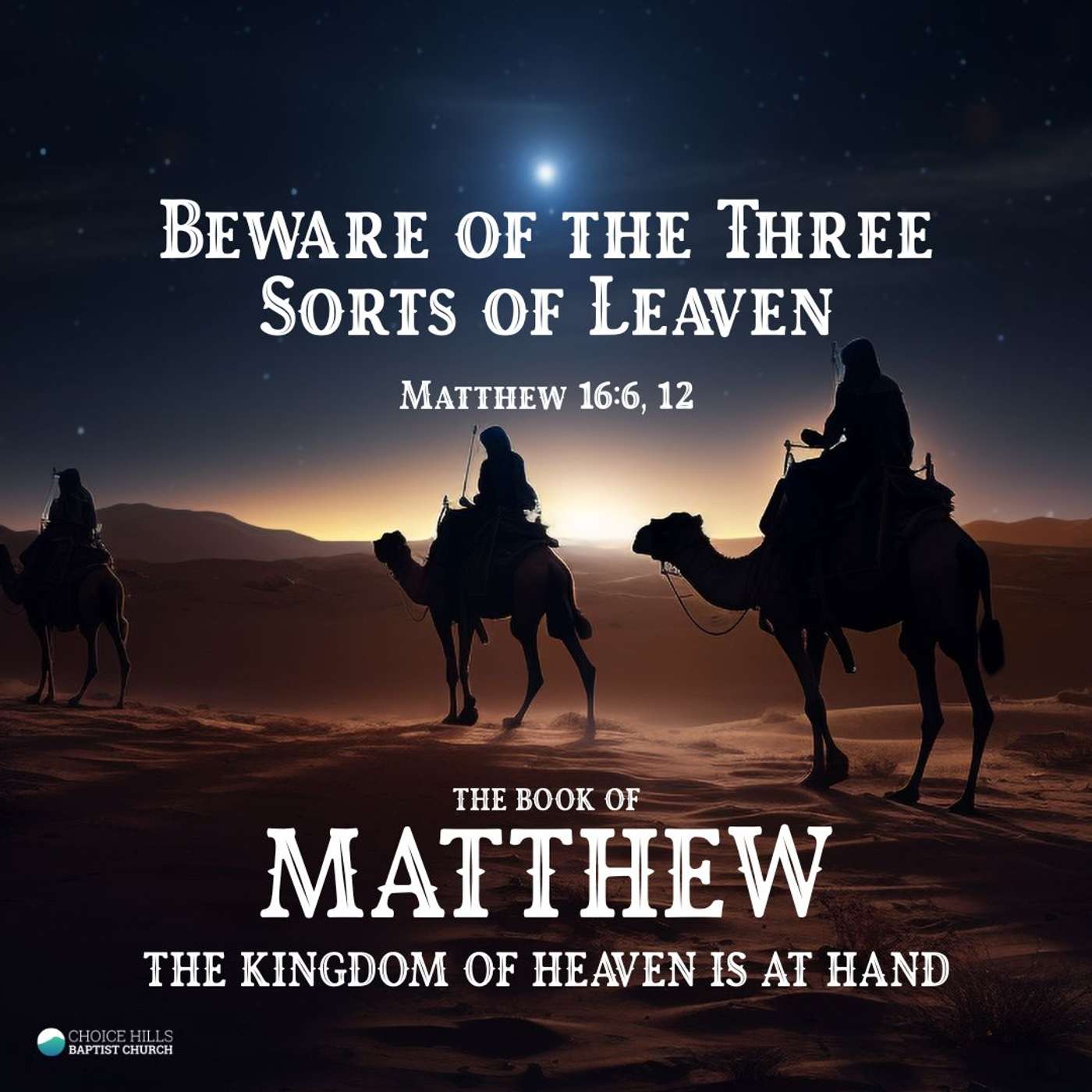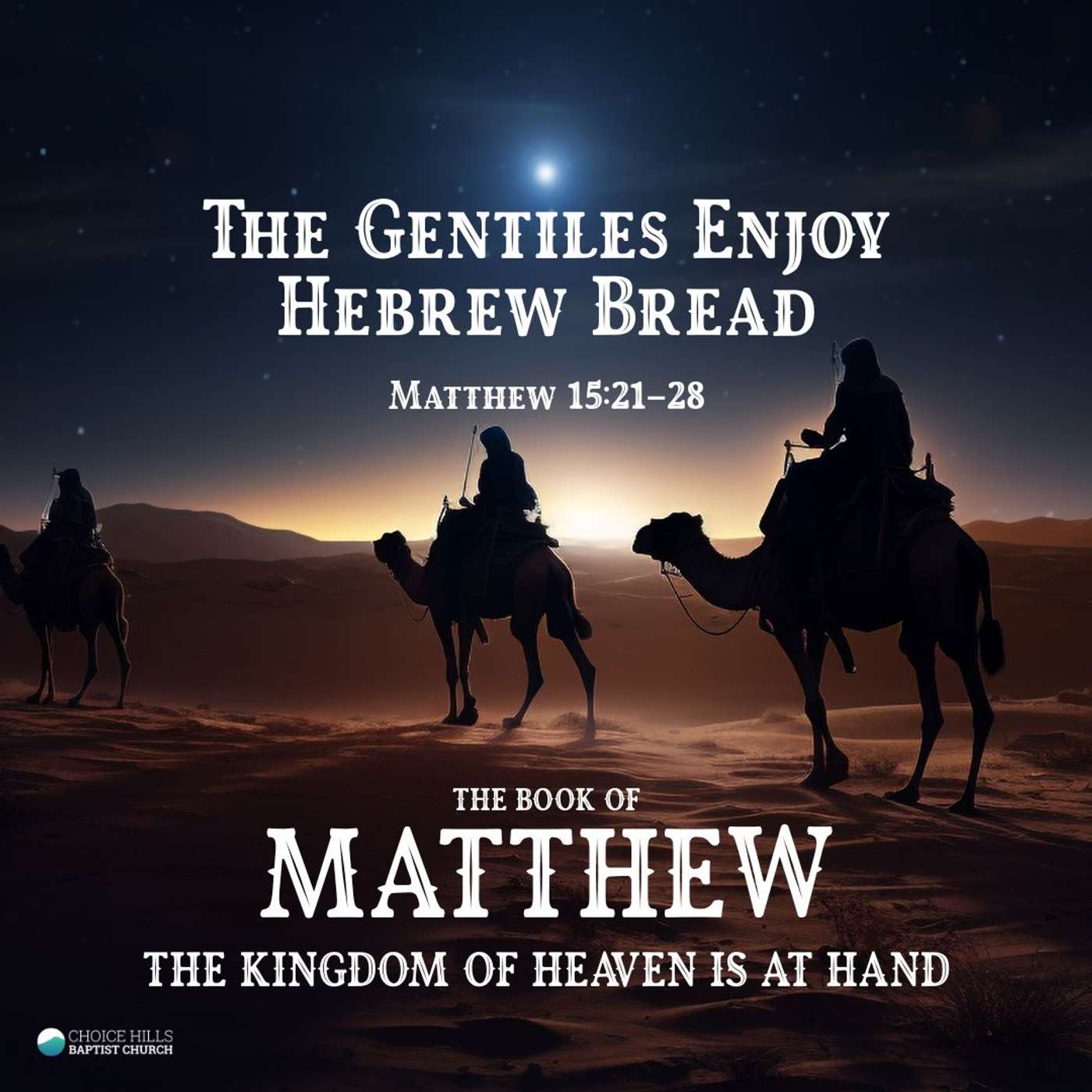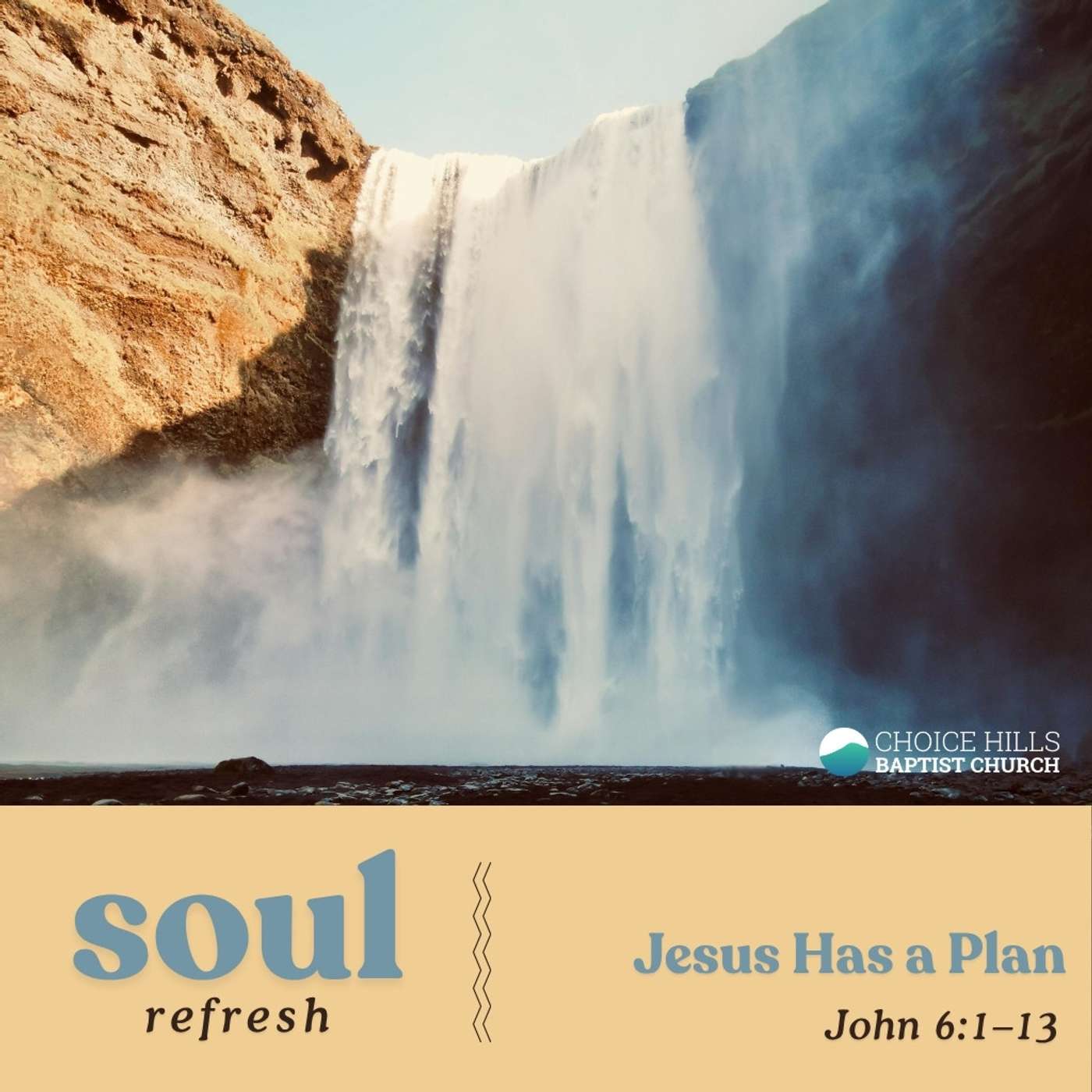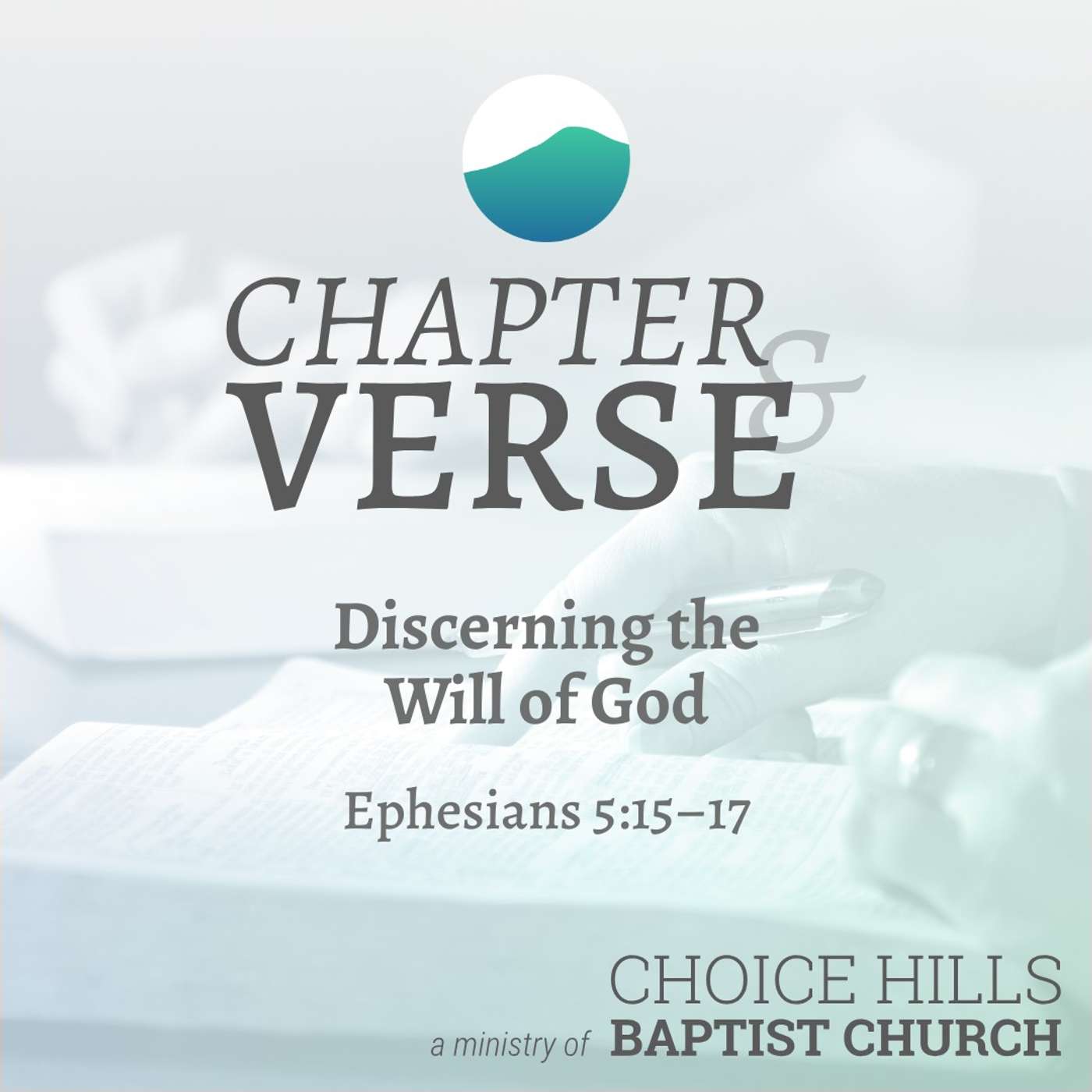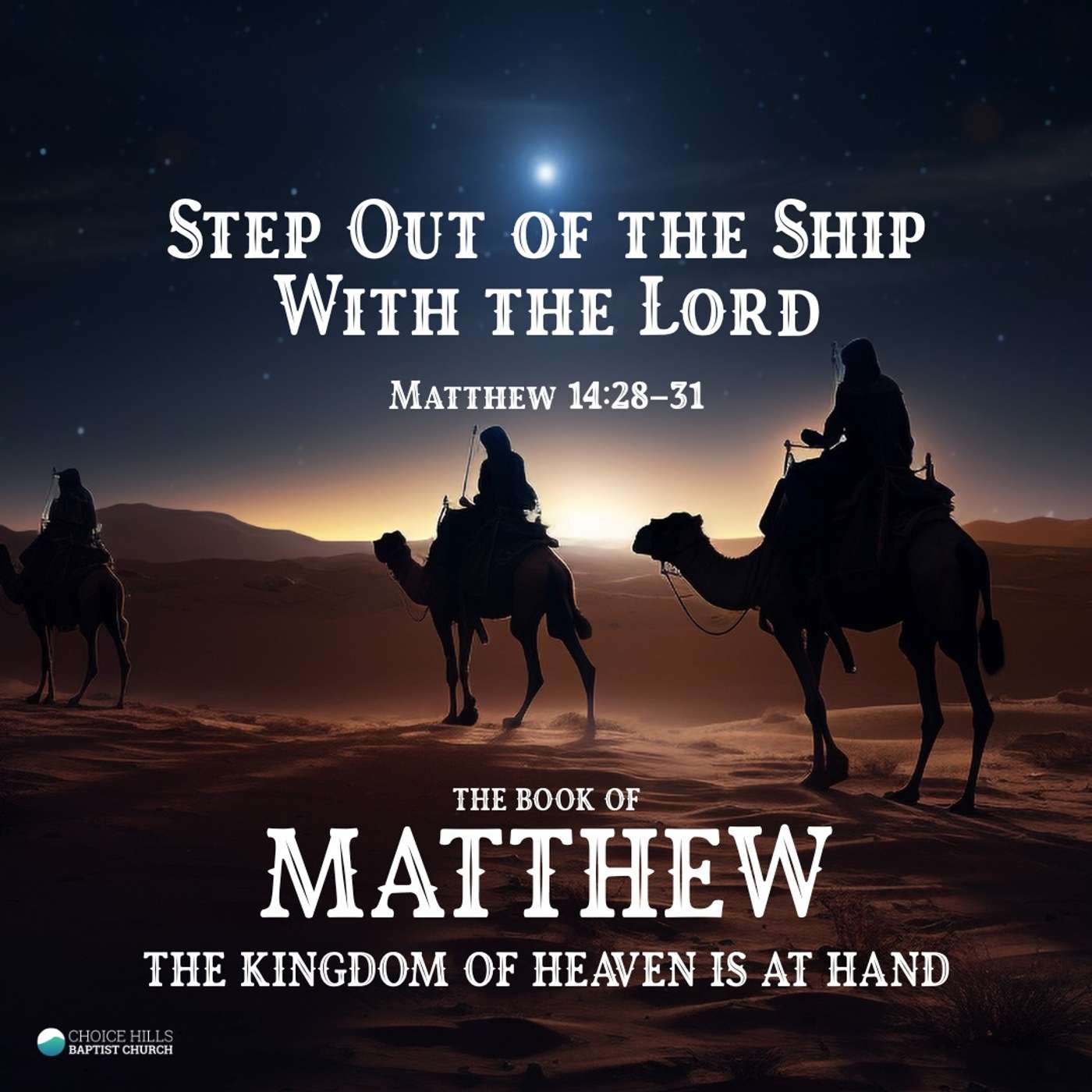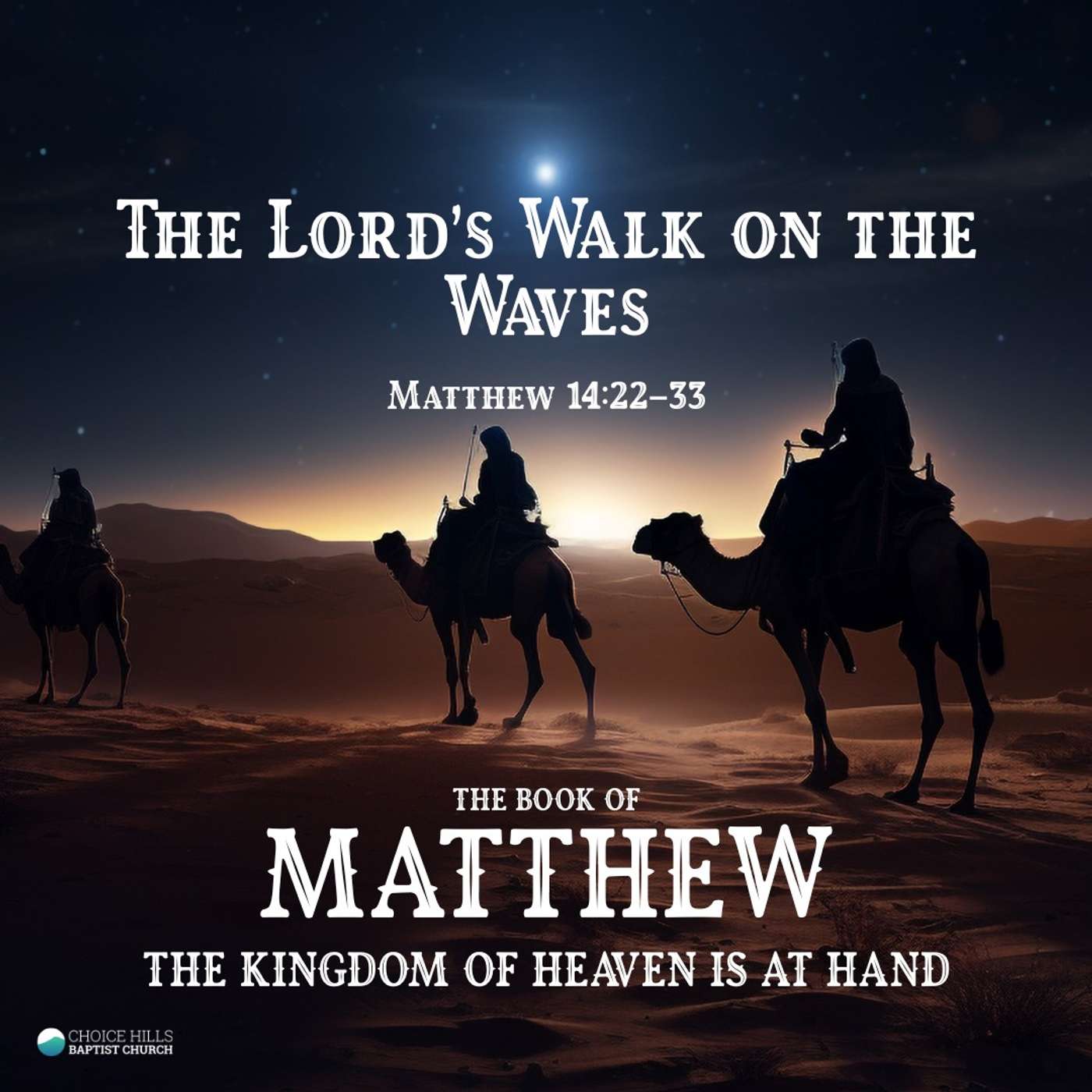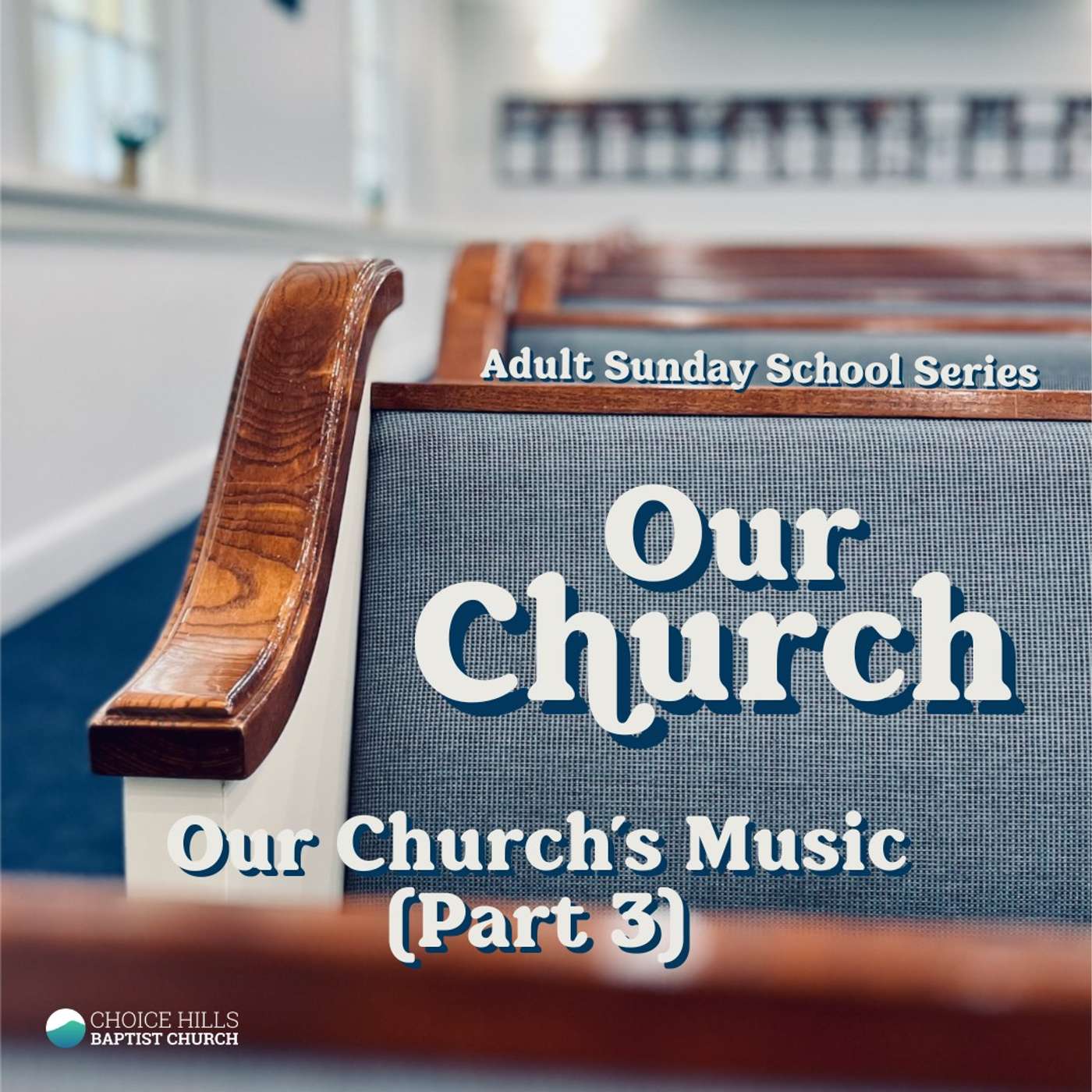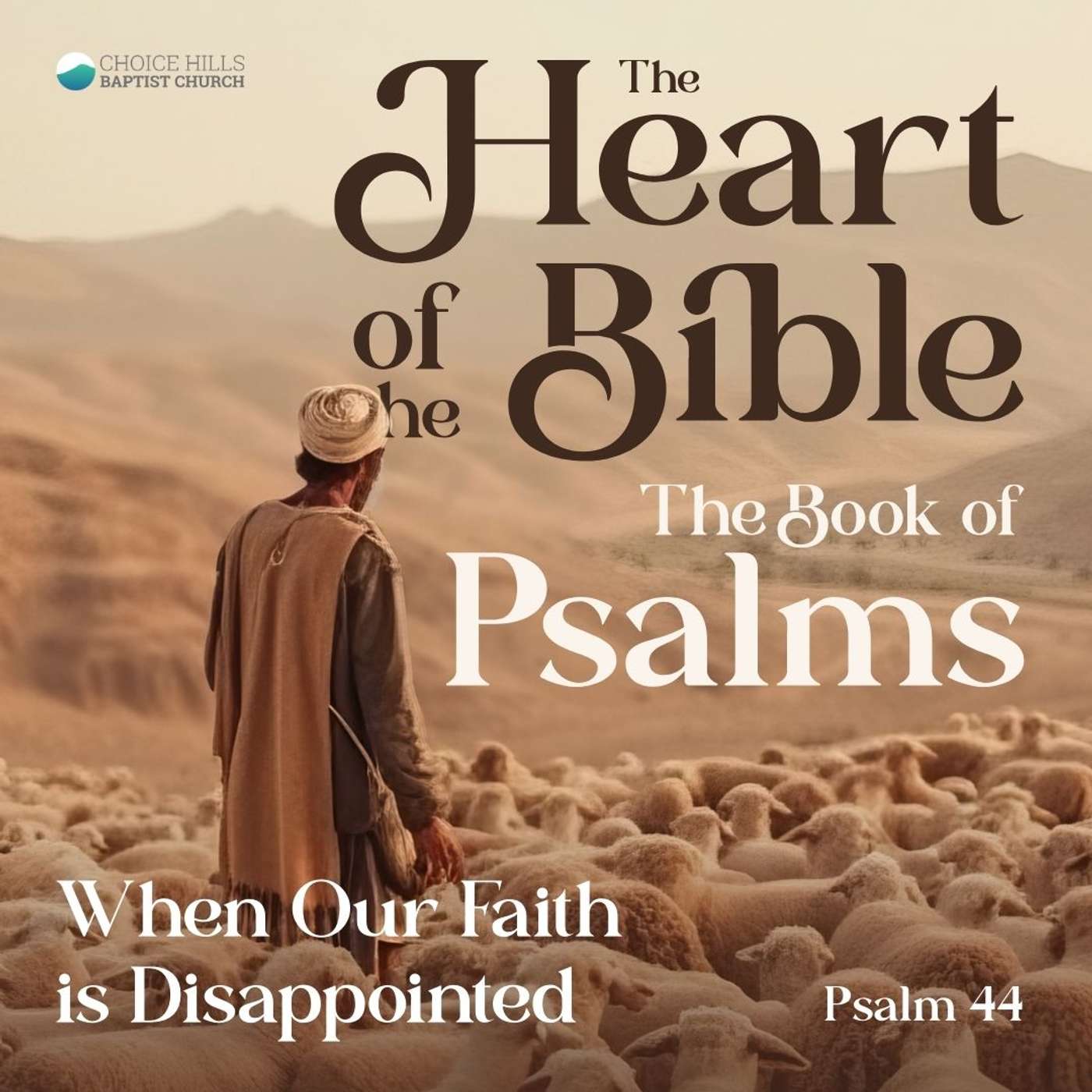Discover Chapter & Verse
Chapter & Verse

897 Episodes
Reverse
The Kingdom of Heaven is at Hand—The Book of Matthew · Pastor Adam Wood · Matthew 16:6, 12 · October 12, 2025Transcript:All right, let's go and return back to Matthew chapter 16. This evening we're gonna look just at two verses as our main text tonight. And I'd like you to also look at Matthew chapter 13 as well. So we're gonna be mostly in Matthew 16, although we're gonna go a few other places as well. But to begin we'll be in Matthew 16 and also we'll take a peek at Matthew 13 as well. So let's go to 16. And we will begin reading verse number six. And we read of course this passage this morning but we're gonna look at something different in the passage. Matthew 16 verse number six. The Bible says this, and then Jesus said unto them, take heed and beware of the leaven of the Pharisees and of the Sadducees. And they reasoned among themselves saying, it is because we have taken no bread, which when Jesus perceived, he said unto them, oh ye of little faith, why reason ye among yourselves because ye have brought no bread? Do ye not yet understand, neither remember, the five loaves of the 5,000 and how many baskets ye took up, neither the seven loaves of the 4,000 and how many baskets ye took up? How is it that ye do not understand that I spake it not to you concerning bread that ye should be aware of the leaven of the Pharisees and of the Sadducees? Verse 12, so we're looking at verse six tonight and verse 12. Then understood they how that he bade them not beware of the leaven of bread but of the doctrine of the Pharisees and of the Sadducees. All right, let's pray together and then we'll look at Matthew 13. Thank you Lord for the opportunity to meet again together and for the assurance that where two or three are gathered together, there you will be in the midst. And Lord, we trust you, though we know that now you are invisible to us. One day you will come, we will see you visibly. But now we trust in your promise that you are here present with us, not only in us but among us, as we meet together as the saints of God. We once again want to commit the time to you where we are studying your word and let it be profitable to us. Help us to grow by it as we look at the scriptures and see what you have spoken in Jesus' name, amen. All right, Matthew 13. The reason I wanna read Matthew 13 is that what we're covering tonight, we covered not too very long ago, actually in, let's see, July 13th. We had an afternoon service. I look back in the record and July 13th, we covered this same passage in the Matthew 13. But I wanna go ahead and read it again because it is actually just one verse. It's in the midst of the parables, of course, and it overlaps a little bit with what we want to talk about tonight, but not entirely. So I wanna kind of build off of what I said in Matthew 13 in verse number 33. Another parable spake he unto them. The kingdom of heaven is like unto leaven, which a woman took and hid in three measures of meal till the whole was leaven. Now you'll remember that when we looked at this verse, we kind of paired it with the parable of the, I just lost my train of thought here, the parable in verse 31 and 32, which is the mustard seed. And the idea here is that the lump, that is the dough, is unleavened because of course that's the picture, that's the symbology from the Old Testament. Of course the Jews had developed or had developed a negative view of leaven due to the fact that during the feast of unleavened bread and Passover, they would have put it out. So it was considered to be, not that they couldn't eat bread that was leavened, but it had a negative connotation as far as in prophecy and things like that and their laws. And so we saw that in this parable, the woman took the leaven and the Bible says she hid it in three measures of meal. And then of course that leaven spread. And we saw how that the leaven represents a certain kind of evil, that it starts small and then it spreads throughout the lump and it corrupts the entire thing, though it starts small. And so we saw that. So go back if you would to Matthew 16 and we're gonna build off of that because we did talk about the leaven of the Pharisees and of the Sadducees in July. And we also referenced chapter 16, which is what we're looking at in detail, more detail tonight. So Matthew 13 has the first mention of leaven in the New Testament and the first mention in Matthew. And then what we're looking at tonight is the second mention of leaven in the Bible. So you have this idea of leaven, or rather in Matthew. You have this idea of leaven is symbolic of corruption. And the lump refers to the people of God and the idea is corruption is spreading through the people of God. And we looked at all kinds of references, especially in the epistles where Paul talks about and he foretells that as we approach the coming of the Lord, so Christianity, we saw it in scripture where Christianity will become more and more corrupted with false teachers and false doctrine. And so that's what the Lord tells us is going to happen within the church. I hate that term, but you know what I mean when I say that, within Christendom. And that's actually what we observe happening. And so here though, there's a little bit more detail and I wanna look at a few other verses based upon this. Look at verse number six again. The Bible says, and Jesus said unto them, take heed and beware of the leaven of the Pharisees and of the Sadducees. So notice there are two groups mentioned here. You have the Pharisees, the leaven of the Pharisees, and you also have the leaven of the Sadducees. Then in verse 12, then understood they how that he bade them not beware of the leaven of bread, but of the doctrine of the Pharisees and of the Sadducees. So you got two categories, but when we refer to leaven, we're talking about doctrine. Now don't misunderstand. Doctrine, although it includes the things that are written on a doctrinal statement, that is not the sum total of doctrine. Doctrine includes a body of faith that we believe, truths that we hold as scripturally accurate, yes. But doctrine also includes any kind of teaching. It's just a word that means teaching. It's sometimes translated the same way, teaching and doctrine. The idea is something that someone teaches. And so what you have here is you kinda wanna pull back the Lord is referring to the characteristic elements and features that were taught by the Pharisees and that were taught by the Sadducees. And there's one other group. So I wanna put forth to you that there's three categories of leaven. Now we did cover this in July, but we're gonna dig a little bit deeper. There are three categories of leaven in scripture used in this symbolic way, this corruption, this false or erroneous doctrine. The first one, if you would look at Luke chapter 12, it's already, it's here as well, but Luke 12 gives us a little bit more information. This is a parallel passage to our text here tonight. Luke 12 verse one. Look at Luke 12, if you would, and verse one. The first one we're gonna look at is the leaven of the Pharisees. Verse one says this, in the meantime, when there were gathered together an innumerable multitude of people, insomuch that they trod one upon another, he began to say unto his disciples, first of all, notice he's speaking to his disciples here and also in Matthew 16. He's speaking to his disciples. At the end, I'm gonna come back to that, okay? But just keep that in mind. Here's what he says, the Lord says, beware ye of the leaven of the Pharisees. Now notice, he doesn't mention Sadducees, he doesn't mention anything else. He only mentions Pharisees and he defines it, which is hypocrisy. So when the Lord said, going back to Matthew 16, when the Lord says beware of the leaven of the Pharisees, he's referring to a specific thing about the Pharisees. Here's what you have to understand. The Pharisees on paper were doctrinally sound. They would have checked all the...
The Kingdom of Heaven is at Hand—The Book of Matthew · Pastor Adam Wood · Matthew 15:32–39; 16:5–12 · October 12, 2025Transcript:Alright, let's get our Bible, go to the book of Matthew chapter 15. This morning we'll be in Matthew 15 and Matthew 16. We'll start in Matthew 15 verse number 29. Matthew 15 verse 29. Matthew 15 verse number 29. The Bible says this, and Jesus departed from thence and came nigh into the city, the sea of Galilee, and went up into a mountain and sat down there. And great multitudes came unto him, having with them those that were lame, blind, dumb, maimed, and many others. And cast them down at Jesus' feet, and he healed them. Notice the word cast. I don't know about you, but when I was reading that I kind of picked up on that word and thought to myself, man, how violent. Because it doesn't say set them down or laid them down, it says cast them down, which is what you do with a rock. Just threw them down at Jesus' feet. Not exactly compassionate, I would say. Verse 31, in so much that the multitude wondered when they saw the dumb to speak and maimed, to behold, the lame to walk and the blind to see, and they glorified the God of Israel. You know yesterday when we were out at the Fall for Greenville, one person, I can't remember who it was, had a conversation with someone, I think it was Ben, if I'm not mistaken, with an atheist type who said that he liked Jesus, and what he meant by that is he liked the humanitarian part of Jesus' ministry, and everybody loves that. Everybody loves the blind to be healed and the lame to walk and the dumb to speak and all of that. Everybody loves that. That's the part, Jesus giving us the things we want to make our life better is the part, and we all enjoy that. I'm not knocking that at all, but really the part that people are not so much interested in is when he starts talking, because that's when there's usually it rubs a little bit. Everybody wants to be healed and everybody wants to be successful and have a bunch of stuff, but when Jesus starts talking is when people start to find other things to do sometimes. Verse 32, And his disciples say unto him, Does that sound familiar to you, to our study in Matthew? Verse 34, And they took up of the broken meat that was left seven baskets full, and they that did eat were four thousand men beside women and children. And he sent away the multitude and took ship and came into the coast of Magdala. Would you pray with me this morning? And he said unto them, And he sent away the multitude and took ship and came into the coast of Magdala. Would you pray with me this morning? Our Father, we just come to you and want to just once again offer our service to you this morning. Offer the word that we've read here and will read further in just a minute. We just want to offer it to you, Lord, that you would bless even as the bread that was given by the disciples to you, and you blessed it and gave it back. So Lord, we want to offer the bread, the word of God to you. We ask for your blessing as we take it back from your hand that it might help us and bless us, Lord. We need your help and grace this morning. Help us to grow this morning. Help us to know you better. Help us to learn to fellowship and trust you more. As we look at these passages of scripture, Help us, I pray, to see ourselves and our patterns in the disciples that are so clearly spelled out in Matthew here. So Lord, would you guide our study this morning? We pray in Jesus' name, Amen. Now this should sound very familiar to all of us. This is the story of the feeding of the 4,000. And the feeding of the 4,000, it's difficult to pin down exactly how much time had elapsed between the feeding of the 4,000 here and the feeding of the 5,000 in Matthew chapter 14. What we do know, we do know some events that occurred between the two. In Matthew 14, after Jesus fed the 5,000, he crossed the Sea of Galilee, and then he heals a man. And then later he has a conversation with the scribes and Pharisees regarding tradition. We covered that pretty recently in our study. And then after that there was this Canaanite woman that has a daughter who is healed from a devil. And then we just read verse 29 through verse 31 where Jesus healed people, and the time is not clearly given. But what we do know is it hasn't been that long. Well Jesus' ministry was only a few years to begin with. But we're talking by a rough estimate, maybe one month to three months period of time. They crossed the Sea of Galilee a few times, going here, going there, teaching. And some of that time, it takes time to do that kind of thing and to teach and such. And so from one feeding of the 5,000 to the feeding of the 4,000, which has only been a couple of months probably, and the feeding of the 4,000 is when you read verses 33 down to verse number 37, 38, it's almost exactly the same. The words are almost the same. The activity, the process is exactly the same. The difference is there were 5,000 beside women and children. Now there's 4,000 beside women and children. Before there were five loaves and two fish, and they took up 12 baskets full of leftovers. Here there's seven loaves and some fish, and they take up seven baskets full. But the fact that Jesus had them sit on the ground was the same. The fact that he took it from them, gave thanks, break it, and then gave it to the disciples who then gave it to the multitude is the same. They were all filled exactly the same. They didn't let anything go to waste exactly the same. And when I come across passages of Scripture in my own personal Bible study that say the same thing twice, and I know these are two different events, and therefore it's recorded twice, and it's two very significant miracles. But when I see that twice and the Lord just puts the same thing again, it makes me wonder, why did you tell us this again? That's what I ask myself. And I think the reason is found in chapter 16. So let's start in chapter 16, verse number 1. The Pharisees also with the desadducees came, tempting him, desired him that he would show them a sign from heaven. And he answered and said unto them, When it is evening, ye say, it will be fair weather, for the sky is red. And in the morning it will be foul weather, for the sky is red and lowering. O ye hypocrites, can ye discern the face of the sky, but can ye not discern the signs of the times? A wicked and adulterous generation seeketh after a sign, and there shall no sign be given it but the sign of the prophet, Jonas. This is again another portion that is repeated in Matthew 12, from Matthew chapter 12. And he left them and departed, verse 5. And when his disciples were come to the other side, they had forgotten to take bread. Then Jesus said unto them, Take heed, and beware of the leaven of the Pharisees and of the desadducees. Now the reason he says this in verse number 6 is because they had just come out of a conversation with those two same groups, the Pharisees and the desadducees. So that conversation had just happened, and so that was fresh on their minds. And so when they got back to private, got back private and they got to the other side of the Sea of Galilee, that's when Jesus brought it up. Because he's still thinking about it. He's still thinking about the fact that these Pharisees and desadducees had asked this tempting question, which was a question with poor motives, but we'll look at that later. Verse 7. And they reasoned among themselves, saying, It is because we have taken no bread. Which, when Jesus perceived, he said unto them, O ye of little faith, why reason ye among yourselves, because ye have brought no bread? Now pause a second. If there is anything that the disciples should understand at this moment, given the recent past, is that lack of bread is not a problem. There were 12 and 7, 19 baskets left over beside the 9,000, not counting women and children, that had eaten the bread and the fish. There were 19 baskets f...
Adult Sunday School: Our Church · Pastor Adam Wood · October 12, 2025Transcript:We are going to, we're gonna be looking at, I don't know how far we'll get, I'm hoping maybe we can finish this section on our church regarding our music. So the title of what, this is part six, six weeks, we've been looking at our church's music. And in this section, I'm hoping, as I said, to finish this section, and what we've been trying to do, for those of you that are visiting or are new, we've been going through, kind of methodically, going through different aspects of our church and why the things are the way they are. And we've been looking at different categories or different aspects of our church. And right now we're looking at music. And so last week we talked about Ephesians 519 and Colossians 316, which both are the main go-to verses in the New Testament regarding songs, hymns, and spiritual songs, and we looked at that in some detail. We also examined how those things, the use of music is related to being filled with the Spirit of God. And we also took some time to examine what it means to be a, when a song is a spiritual song. And we saw that a spiritual song is set in contrast to a carnal song. It's not, the Lord is not giving us a genre of music, he's describing a kind of song, which is a spiritual song, which relates back to Galatians chapter five and the fruit of the Spirit versus the works of the flesh. And so that's one way we can judge music. And that's one way that we, in our church, judge our music. So these things kind of overlap, that overlaps with our personal music, as well as the music that we use in our church. So we also examined and looked at our hymn book, and we examined why we use the hymn book, and why we have chosen to use it. And we saw how that hymns in a hymn book are generally speaking, rich in doctrine. And we saw also in Colossians how the songs are supposed to be, include the word of Christ, which is designed to admonish us and to teach us in song. And so that's where the hymns need to be substantial, and they need to affirm our faith and strengthen our faith. Not only that, but we also saw how the hymns, because of, primarily because of their age, provide a vital connection with the past work of God to generations gone by. And that's, I know it was definitely true in my generation, but the generation after me, like my kids' generation, there is definitely an element that seeks to dismiss prior generations and the wisdom, the accumulated wisdom, as if we just came here and everything was, we did it all. Our generation was the first one that ever was born on the earth. And so what the hymn book does is, and this goes along with church history. One of the reasons that church history is so important is because it provides that connection. We did not start this thing called Christianity. We did not start it. It was started by Christ. Well, you can even go further back than that with the Old Testament, but it was started by Christ, and then those who believed carried it on through the generations, and that's why we're here. We're here because of the word of God that was carried to us. So we're not islands. We owe a great debt to those who came before us, and we can't just simply wave our hand to dismiss that. And part of the hymn book is that the hymn book and specifically the songs in it provide that connection. When you can read a song that's 300 years old, or in some cases 500 years old, and it's saying the same thing that you believe from the word of God, that's significant. That's not something that's minor. The other thing we talked about, again, we're just looking at practical matters, is, looks like I got my notes mixed up here. We looked at the practical use of the notes in a hymn book, and why that's important, because it enables the congregation to sing as a congregation in parts with greater skill. That's why we have, that's why the hymn books are written in four-part harmony, that's why. They're designed to be sung as a congregation, and that's why they have them. So that's not something we're gonna get rid of, that's not something we're gonna change. I would like to see us move more in that direction of using that and singing with skill to the Lord as a congregation. And so that leads us to the question of congregational singing, congregational singing. So let's pray, and then I would like you to turn to 1 Chronicles chapter 15. 1 Chronicles chapter 15 is where we're going to begin this morning. Let's pray together. Our Father, we thank you for the opportunity to meet together as your people. Thank you for your people that have gathered here today. Lord, there's beautiful weather outside, crisp mornings and warm in the afternoon, and we're just so thankful for that. And thank you for the opportunity to share the gospel with people yesterday. And all the people that got witnessed to, got tracked, and we were able to speak to, and even just be counted to be present, Lord, but we know it's not by our own goodness or power, we're just weak, but the grace of God is what enabled us to give out the gospel, Lord. And as we go into Sunday School now and our service to follow, where we try to meet together and give you praise, we pray that you would oversee everything that's done, that Lord, we offer this time to you and ask for your guidance and your help. Lord, I ask for that directly from me, that I might be able to help your people, and also for your people, that we all might receive the word of God in great meekness. For we ask in Jesus' name, amen. All right, so while we're talking about hymn books, we're talking about congregational singing, which is the primary purpose of having a hymn book. And so, 1 Chronicles 15, verse number 16, and I could go to a number of passages. I'm not trying to be exhaustive with this, so you know, you could, of course, you can, when you have opportunity, you can look up the different references regarding this, but in the Old Testament, David, being a man who was a musical man, he was a man who was skilled with instruments, so skilled, in fact, that he was actually called to go play music in the king's court. I mean, so he wasn't an average music player. He was skilled in the harp, and so he was a musician himself, and so it's no wonder that once he rose to the throne and was established, those things were in his heart to do, and you know what he did? He established skilled musicians among the Levites to sing praise to God for the people of Israel, and he did it, and I mean, if you think about it, this was, a lot of things that David did were things that came straight out of his heart to God, just this overflow of his love for God, and this is one of them. And so he organized the Levites, because by the time you get to David's reign, about 1,000 years before Christ, by the time you get there, the Levites are, there's many, many Levites. They have courses, because there's so many. They have different jobs they're doing at different times of the year, because they multiply. Same thing with the priests. And so because of that, he organized them into musicians and singers. Look at chapter 15 of First Chronicles, verse number 16. The Bible says, and David spake to the chief of the Levites to appoint their brethren to be the singers with instruments of music, sultries and harps and cymbals, sounding by lifting up the voice with joy. And so that's what they did. So what I'm trying to establish here is there is a clear precedent in scripture for having skilled musicians, not what I am, but a skilled musician to lead the praise and the singing of God's people. And that's what you have here. There were skilled musicians who were appointed for that purpose. You might say it's a choir. You might say it's an ensemble. However you wanna put it to kinda translate it into our day, but you do see it in scripture. So that is a clear precedent. These were people of skill who could play inst...
The Heart of the Bible—The Book of Psalms · Pastor Adam Wood · Psalm 45 · October 8, 2025Transcript:Psalm 45. I just actually want you to hold your place in Psalm 45 and we're gonna just spend a little bit of time this evening in Hebrews chapter 1 as well. So if you'll hold your place here and go to Hebrews chapter 1 and kind of hold both places because I want to read both places together. Okay Hebrews chapter 1 I guess we can go ahead and go to Hebrews chapter 1 first and get a kind of a background. This is a very interesting psalm and by interesting what I mean is that it is different than the other Psalms, the other 44 Psalms, most of the other 44 Psalms that we've studied because the content is just totally different. It's prophetic from start to finish. The psalm is prophetic and so there are parts of the psalm that are not exactly easy to understand if I can put it that way because of the prophetic nature of it but you'll see why I say it's prophetic in just a minute. In Hebrews chapter 1 if you would look at verse number, let's just start in verse number 1 to pick up the context. The Bible says, God who at sundry times and in diverse manners spake in time past unto the fathers by the prophets hath in these last days spoken unto us by his Son whom he hath appointed heir of all things by whom also he made the worlds who being the brightness of his glory and the express image of his person and upholding all things by the word of his power when he had by himself purged our sins sat down on the right hand of the Majesty on high. Notice that these are these are characteristics that alone belong to deity, right? The scriptural deity that is he who is God alone that is applied to the Lord Jesus Christ. I can't understand how somebody could read Hebrews chapter 1 honestly and come away thinking that Jesus is anything else than very God. It actually says the brightness of his glory and the express image of his person. You know what that say? Jesus is God. I mean it's it could not you know you can weasel out of it you know linguistically if you want but it is clearly stated and if that was in doubt at all he goes on to say he upholds all things by the word of his power. So those are characteristics of deity the fact that he is the creator. Verse 4 being made so much better than the angels as he had by inheritance obtained a more excellent name than they for under which of the angels said he at any time thou art my son this day have have I begotten thee and again I will be to him a father and he shall be to me to me a son and again when he bringeth in the first begotten into the world he saith let all the angels of God worship him so to which of the angels did God ever say that to? None of them none of them. Verse 7 and of the angels he saith who maketh his angels spirits and his ministers a flame of fire. Okay so that's that's the first part now we pivot to the second but unto the son now let's stop here a second who is the speaker we see so we see who he's talking to but who is the speaker if you would look at the context again but unto the son he Who is the he? Who is the he? Huh? God is verse 1 and you follow God spoke and then you go down to verse 5 you follow the context verse 5 unto which of the angels said he that's God and again when he God bringeth and of the angels he saith that's God of verse 1 then you get to verse 8 we're still talking about the same he God now listen carefully read very carefully what God says to the son but unto the son he God saith thy throne O God is forever and ever a scepter of righteousness is the scepter of thy kingdom thus loved righteousness and hated iniquity therefore God even thy God hath anointed thee with the oil of gladness above thy fellows and this is still God talking to the Sun this is nuts this is God talking to the Sun he goes on and thou Lord in the beginning has laid the foundation of the earth and the heavens are the work of that works of thine hands they shall perish but thou son he's still talking to the Sun remainest and they shall all wax old as the garment and as a vesture shall thou fold them up and they shall be changed but thou son art the same and thy years shall not fail again attributing the characteristics of deity to the Sun Jesus but in verse 8 the thing I want you to point out to I want you to point out is when this where this verse says unto the Sun he saith thy throne O God so this is God telling calling the Sun God okay now I want you to put that in your mind as we go back to Psalm 45 Psalm 45 and look at verse starting in verse 1 Psalm 45 verse number 1 it says to the chief musician upon Shoshanim for the sons of Korah my skill a song of this is this is a love song but it's not a love song in the sense of the love of a man and his wife but this is a love song within I hope I don't lose you here within the Godhead this cut this is kind of stuff that they don't mess up your theology all right so in this Psalm you'll see verse number look take a peek at verse 6 ahead of time look at verse 6 ahead thy throne O God is forever and ever a scepter of thy kingdom is a right scepter so what we read in Hebrews 1 was quoted out of Psalm 45 everybody follow that but what do we know from Hebrews that is not initially readily apparent in Psalm 45 is that the speaker is God and he's the person to whom he is speaking is the Son that's what Hebrews tells us Hebrews 1 8 says that the recipient of these words in verse 6 is the Son so what you do is because you know that from the New Testament you take that truth and you if I can say this word extrapolate it and start at the beginning of the psalm knowing that knowing that so we're gonna start at the beginning of the psalm knowing that the person to whom the psalmist is speaking is the Son of God Jesus Christ now let's start with that in mind let's move forward verse 1 my heart is indicting a good matter you know what indict means it means to compose like you're writing something I speak of the things which I have made touching the king my tongue is the pin of a ready writer thou art fairer than the children of men now let's stop this that's where we begin thou you that's second persons second person singular so the writer of the psalm right is the author of the psalm is writing to this person this person is identified in Hebrews as the Son of God in verse 6 thou son of God Jesus Christ art fairer than the children of men grace is poured into thy lips therefore God hath blessed thee forever I'm gonna keep reading I'm gonna come back to verse 2 in just a minute because this is really gonna it's really gonna get crazy here in just a minute gird thy sword Jesus upon thy thigh O most mighty with thy glory and thy and in thy majesty ride prosperously because of truth and meekness and righteousness and thy right hand Jesus shall teach thee terrible things thine arrows are sharp in the heart of the King's enemies whereby the people fall under thee thy throne O God is forever and ever the scepter of thy kingdom is a right scepter thou still talking to the Sun Jesus Christ love is righteousness and hate is wickedness therefore God thy God hath anointed thee with the oil of gladness above thy fellows mark that verse or note that verse as well because we're gonna look at that verse with verse 2 in just a minute all thy garments still talking about Jesus smell of myrrh and aloes and cast you out of the ivory palaces whereby they have made thee glad that's where the song comes from out of the ivory palaces into the world of woe and you know what is thoroughly scriptural right Kings daughters were among thy honorable women upon thy right hand did did stand the Queen in gold of offer okay now let's go back to verse 2 for fun all right look at verse 2 thou art fairer than the children of men grace is poured into thy lips therefore God hath blessed thee forever now follow me in verse 2 and also read verse verse while we're here read verse 7 becaus...
The Kingdom of Heaven is at Hand—The Book of Matthew · Pastor Adam Wood · Matthew 15:21–28 · October 5, 2025
The Kingdom of Heaven is at Hand—The Book of Matthew · Pastor Adam Wood · Matthew 15:10–20 · October 5, 2025
Adult Sunday School: Our Church · Pastor Adam Wood · October 5, 2025
Soul Refresh 2025 · Guy Roberts · Proverbs 4:1–27 · October 2, 2025
Soul Refresh 2025 · Guy Roberts · Psalm 19:7–14 · October 1, 2025
Soul Refresh 2025 · Guy Roberts · John 6:1–13 · September 30, 2025
Soul Refresh 2025 · Guy Roberts · Luke 5:1–11 · September 29, 2025
Soul Refresh 2025 · Guy Roberts · Luke 24:1–35 · September 28, 2025
The Kingdom of Heaven is at Hand—The Book of Matthew · Pastor Adam Wood · Matthew 15:1–9 · September 28, 2025
Adult Sunday School: Our Church · Pastor Adam Wood · September 28, 2025
Andrew Rausch · Ephesians 5:15–17 · September 24, 2025
The Kingdom of Heaven is at Hand—The Book of Matthew · Pastor Adam Wood · Matthew 14:28–31 · September 21, 2025
The Kingdom of Heaven is at Hand—The Book of Matthew · Pastor Adam Wood · Matthew 14:22–33 · September 21, 2025
Adult Sunday School: Our Church · Pastor Adam Wood · September 21, 2025
The Heart of the Bible—The Book of Psalms · Pastor Adam Wood · Psalm 44 · September 17, 2025
Rick Schworer · Acts 26:18 · September 14, 2025


